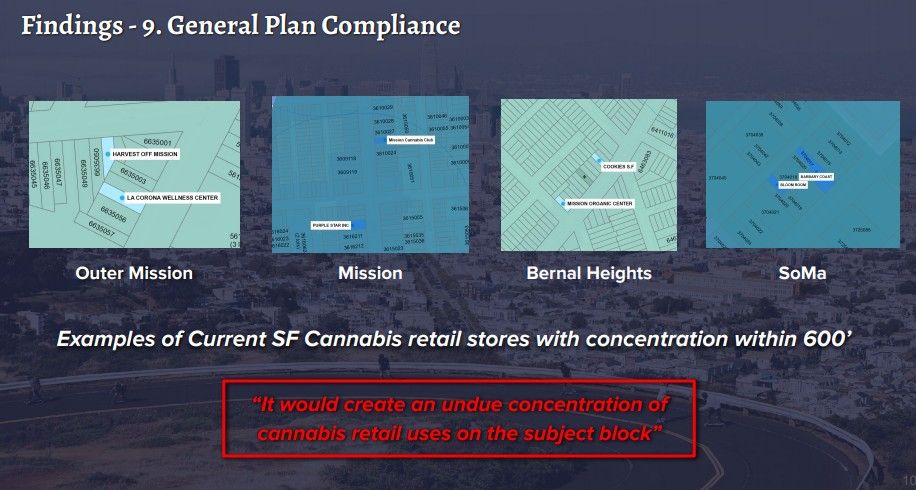A dispensary the Planning Commission rejected for being too close to another just won an appeal before the Board of Supervisors, but some Vis Valley residents complained that it’s corporate weed in sheep’s clothing.
Way back in the medical marijuana days of 2017, we told you the story of two dispensaries proposed on the same block in Visitacion Valley. Once medical marjuana transitioned to what we now call “recreational cannabis,” one of those two called Elevated SF opened in 2018 on Bayshore Boulevard. The other appeared doomed this past May 27, when the Planning Commission denied their request on the basis that it would violate the local law that you can’t have two cannabis dispensaries within 600 feet of one another. The Planning Commission rejected it by a 4-3 vote, saying “it would create an undue concentration of cannabis retail uses on the subject block.”
The Board of Supervisors voted 10-1 to approve the 5 Leland Ave Dispensary..... Thank you @shamannwalton @DeanPreston @HillaryRonen 🌱🙏🏽 pic.twitter.com/7msxSCuEbc
— San Francisco Social Club (@SFSC415) July 28, 2021
But that proposed dispensary at 5 Leland Avenue won on appeal, as the Board of Supervisors voted 10-1 Tuesday to overturn the Planning Commission ruling and let that cannabis shop open.

“There are many vacancies on the Leland corridor today,” the dispensary’s co-owner Joseph Reiss told the Board, presenting the slide above. “When it comes to saturation, there are four other areas that have two cannabis businesses within 600 feet of each other in the city. So it wouldn’t really be violating anything that hasn’t already been carved out.”
He added that though these locations are close, there are still only two dispensaries in Visitacion Valley (this would be the third), a neighborhood with a population of more than 42,000 people.

And while there is a 600-foot rule, there is also a loophole to the 600-foot rule. That rule was established in 2018, and if a dispensary applied for its permits prior to 2018, they are entitled to exemption and can be grandfathered in.
“Right near my house, there are four cannabis stores within a short distance from one another,” Sup. Hillary Ronen said. “It turns out some of those stores have been some of the best in the neighborhood. First of all, having a security guard out front of every one of those stores has made the corridor and neighborhood feel safer. The fact that they took over four vacant storefronts has enlivened the blocks, brought extra customers to the restaurants surrounding them.”
But you may have noticed we have not yet named this freshly approved dispensary, and very unusually, they currently do not have a name. And their ownership structure has evolved over the years in a way that some residents charged is an intention to skirt the city’s equity program intended to “foster equitable participation in the cannabis industry and create business opportunities for those negatively impacted by the War on Drugs.”
As SF Weekly reported in May, the shop was originally “referred to as ‘Connected SF’ in application documents from 2016 and now nameless according to forms filed in 2021.” That paper also notes a strangely evolving cast of listed owners, saying that “an examination of application documents reveals a number of San Francisco cannabis pros with established industry connections alongside equity applicants.”
If they are indeed still the Connected Cannabis brand (which already has a shop in Crocker-Amazon), then they just got a $30 million venture capital infusion, and are hardly the locally owned, War on Drugs victims they sold themselves as to the supervisors.
“They have access to $30 million. This is not a mom and pop operation, this is a shadow corporation behind this,” Vis Valley resident Russel Morine told the board. “They’re going to flip it for a quick profit to another group.”
These purported co-ownership arrangements between big weed brands and local equity applicants are becoming more common, and it’s fair for local pot smokers to wonder if the equity laws are being exploited. But still, as we (hopefully) come out of the COVID-19 economy, such arrangements may be one of the only feasible economic models for brick-and-mortar retail growth. As Sup. Shamann Walton said Tuesday, “This project eliminates vacancy on the corridor.”
Related: Two Pot Dispensaries On One Block Grows Grassroots Opposition In Visitacion Valley [SFist]
Image: Google Street View

